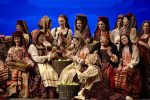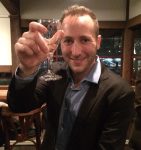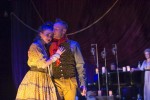A scene from Vancouver Opera’s production of Eugene Onegin. (photo by Trudie Lee)
“I’ve sung a lot of Russian, and I love it,” Jewish community member and opera singer Leah Giselle Field told the Jewish Independent. Field will have a lot to love at this year’s Vancouver Opera Festival, which starts next weekend.
Russian White Nights, the second annual Vancouver Opera Festival, celebrates Russia’s luminous midsummer nights. Among the festival offerings is Eugene Onegin, based on the classic of Russian literature by Alexander Pushkin, which was turned into a lyric opera with a libretto co-written by Pyotr Ilyich Tchaikovsky with K.S. Shilovsky. The festival will also feature the première of The Overcoat, an opera based on Nikolai Gogol’s famous short story, as well as Requiem for a Lost Girl, an original chamber musical collaboration that explores themes around homelessness and violence towards women.
According to the press material, Eugene Onegin – which plays April 29 in the afternoon, and the evenings of May 3 and May 5 – promises “breathtaking music [and] choreography, lavish orchestrations and compelling arias.” Field will be playing the role of Larina, the mother of the two main female protagonists of the story, Olga and Tatyana.
“The libretto includes portions of the original verses of Pushkin,” Field said, noting that the score is one of her favourites. “Tchaikovsky originally thought it would be blasphemy to make Pushkin’s poem into an opera, but eventually he agreed. I love the Pushkin poem the opera is based on as well – it’s so environmentally evocative, it is so Russian, and it takes you into right into that environment.”
A number of Russians feature in the cast, including baritone Konstantin Shushakov (Onegin), soprano Svetlana Aksenova (Tatiana) and tenor Alexey Dolgov (Lensky). This new production has been created in collaboration with Calgary Opera and is directed by Tom Diamond and conducted by Jonathan Darlington. Eugene Onegin will be sung in Russian with English surtitles projected on a screen.
In addition to Eugene Onegin, Field will participate in a chamber music performance of Dmitri Shostakovich’s From Jewish Folk-Poetry Op. 70 on May 4, 5 p.m., at CBC Studio 700. This song cycle was written in 1948 by the Soviet composer, who initially wrote eight songs that were meant to reflect the hardships of being Jewish in the Soviet Union. In order to disguise this sensitive material, Shostakovich added three more songs depicting the “great life” Jews had under the Soviet regime. Despite these efforts, the censors were not fooled and refused to approve the work – it could not be performed until after Stalin’s death in March 1953.
On the lighter side, Field will also appear in a family-oriented original adaptation of Maurice Sendak’s Where the Wild Things Are, a student performance co-produced by Vancouver Opera and Delta School of Music on May 5, 1 p.m., also at CBC Studio 700. The production is one of four offerings aimed at children and/or teens on the festival’s Family Day.
Vancouver Opera general director Kim Gaynor, also a member of the Jewish community, is in her second season at the organization, which she came to after years working the festival circuit in Europe. Gaynor told the Independent that she has modified the Vancouver festival quite a bit from its first year, trying to take a more “out of the box” approach. This includes a more diverse and daring program with a mixture of classical and contemporary works, and the inclusion of chamber music. The festival will also include three films: the silent film Man With A Movie Camera on April 28, the 2001 CBC production of The Overcoat on April 29 and 1965’s Dr. Zhivago on May 1.
The festival starts on April 28 with an outdoor celebration at Queen Elizabeth Theatre Plaza that features Russian cultural performers, food trucks, market vendors, a circus presentation, a movie screening and a patio bar. Festivities that day will get underway at 2 p.m., and a highlight will be the re-creation of the pinnacle of white nights celebrations in Russia that evening. A 40-foot schooner with scarlet sails will serve as the stage for acrobatics, music and custom-designed projections on the 22-foot-high sails in a performance suitable for all ages. Scarlet Sails will also be offered April 29 and May 3 and 5.
The Vancouver Opera Festival runs to May 6. The full program and more information can be found at vancouveropera.ca.
Matthew Gindin is a freelance journalist, writer and lecturer. He is Pacific correspondent for the CJN, writes regularly for the Forward, Tricycle and the Wisdom Daily, and has been published in Sojourners, Religion Dispatches and elsewhere. He can be found on Medium and Twitter.



